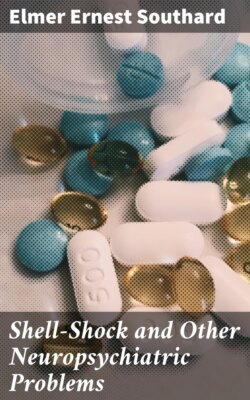Читать книгу Shell-Shock and Other Neuropsychiatric Problems - Elmer Ernest Southard - Страница 35
На сайте Литреса книга снята с продажи.
ОглавлениеWar strain; shell explosion; unconsciousness. Sensory and motor disorders. Subject an old syphilitic.
Case 27. (Karplus, February, 1915.)
A captain, 34, was under much stress and strain in the field and gave himself over to excesses of alcohol and tobacco. August 25, 1914, at the Krasnik battle he suddenly saw at his right a gleam of fire and was afterward able to remember very distinctly the words of a lieutenant standing near by, “The man is dead.” Three or four hours later he came to himself at a relief post, vomited and bled a good deal from nose and mouth. He heard later that he had been thrown on his back.
Manual tremors and general pains developed in the next few days. Two weeks after the accident a slight nystagmus on looking to the left appeared, but there was otherwise no disorder of head or extremities. He was able to sit up, supported by his arms, and he was able to contract his abdominal muscles normally. As for his legs, active movements were limited and weak. He could not lift his legs. The paralysis was more marked distally. He could walk with the support of two persons, but was unable to lift his feet from the ground. The right upper abdominal reflex was elicited, and both patellar reflexes were tolerably active. Cremasteric and plantar reflexes were absent. Neither of the Achilles jerks could be produced. There was hypesthesia and hypalgesia of the lower extremities, and of the back up to a horizontal line corresponding with the ninth dorsal segment; thermo-hyperesthesia and disorder of vibration sense in the lower legs. Both the motor and the sensory disorders were more marked on the right than the left. Insomnia and battle dreams.
The gait disorder and paresis gradually improved. There was no alimentary glycosuria and adrenalin produced no mydriasis. In the course of several weeks the patient gained seven kilograms, began to sleep well and showed gradual improvement in his gait and in the execution of various movements with his feet. The abdominal reflexes were now both present, but there were no plantar reflexes and the Achilles were still both absent. The sensory disorder remained unchanged, so far as the skin was concerned, but the deep sensibility improved. Both legs from the knee down were somewhat cold.
This man had had syphilis at twenty-two, had gone through an inunction cure, and repeated W. R.’s came through negative. He had suffered from vomiting spells and anxiety feelings for a number of years which had been diagnosed by physicians as cardiac neurosis. Yet for a year before going into the war he had felt absolutely well.
